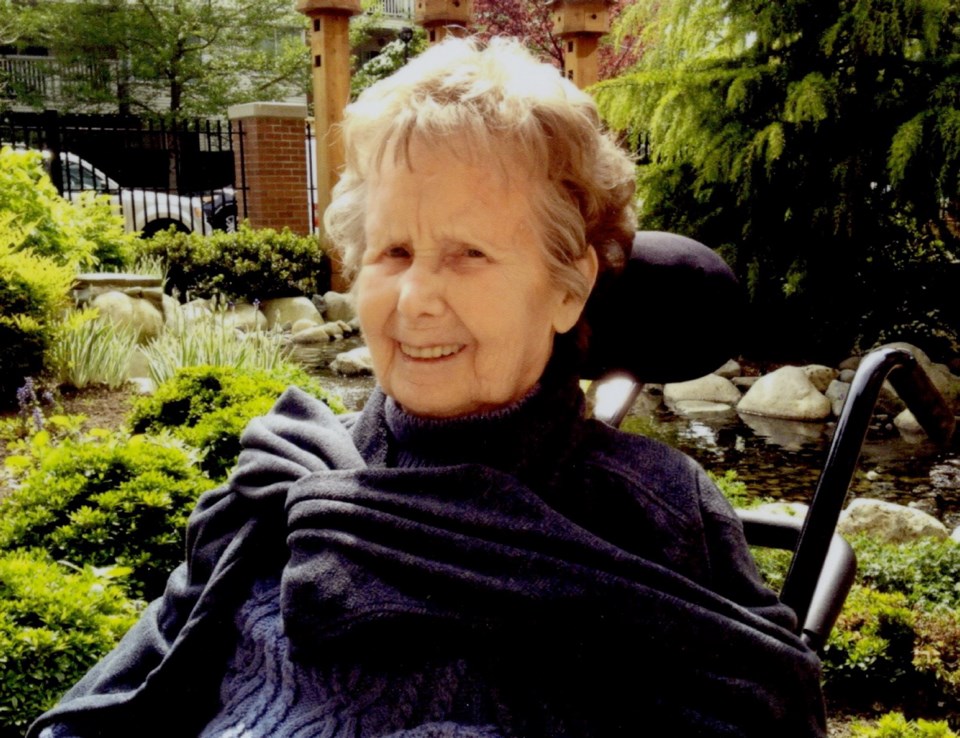The death of an 87-year-old resident of Selkirk Place has been directly linked to a norovirus outbreak at the facility last month.
Janis Helen Smith died Aug. 3 at Royal Jubilee Hospital after being transferred from the long-term residential care facility a few days earlier.
The cause of death was listed as “norovirus infection” on the physician’s medical death certificate, a copy of which was provided to the Times Colonist by Smith’s daughter.
The family is raising concerns about the care their mother received in her final days at Selkirk Place and the way victims of the outbreak were characterized by the Vancouver Island Health Authority.
“Mom suffered and it was unnecessary,” says Jill Rutledge. “I want them to accept that there’s no excuse for what my mom went through.”
Selkirk Place, in Victoria at 385 Waterfront Cres., issued a statement July 31 saying health and safety “is our number one priority” and that the facility took immediate steps to deal with the outbreak. The facility and its owners, the Ahmon Group, did not respond to interview requests Monday.
The health authority said it was unable to comment on specific cases due to patient confidentiality. But it confirmed that licensing officials are investigating two complaints regarding care at Selkirk Place.
“We are saddened by the deaths at Selkirk Place and our condolences go out to the families and staff who care deeply for these elders,” VIHA spokeswoman Sarah Plank said.
VIHA confirmed last week that the nine deaths at Selkirk Place during the outbreak was three times higher than usual for that time of year. Medical health officers said that none of the deaths had been directly attributed to norovirus, noting that many residents have multiple health problems.
“In general, almost all elderly residents of residential care facilities today would be considered frail, and at risk from an illness such as norovirus or influenza, which can contribute to their death,” Plank said.
But Rutledge contends that, although her mother had Alzheimer’s, her overall health was fine until she fell ill with norovirus on July 10. She had been at Selkirk Place for more than a year by that point and Rutledge believes she would have lived much longer.
“She wasn’t ready to go,” she said.
Once she fell ill, Smith was kept in isolation for eight days without the family being able to visit. Rutledge said the facility told the family her mother was doing fine until July 18, when they indicated that she was failing. The family asked that she be taken to hospital, where, Rutledge said, staff indicated that she was badly dehydrated and her personal hygiene was “unacceptable.”
She was treated and sent back to Selkirk Place. A few days later, she ended up at Royal Jubilee and never left.
Rutledge believes her mother should have been taken to hospital far sooner, and suspects Selkirk Place was too short-staffed to properly monitor her mother’s deteriorating condition. Rutledge said staff complained about shortages even before the outbreak and she suspects the situation worsened when so many workers got sick.
The health authority said 100 residents and 50 staff fell ill during the outbreak.
“I’m not blaming [staff],” Rutledge said. “They did the best they could do given the shortage of nurses and staff. ... There needs to be a change and there needs to be more resources or funding to make sure this doesn’t happen to somebody else’s mom or father or friend.”
Plank said the health authority monitors all residential care providers to make sure staffing levels are appropriate.
“We do know that during the outbreak, staffing was a challenge for the facility because of the number of staff affected,” she said. “We did check in with the facility during the outbreak to offer additional staff supports if needed, but they were managing.”
The union that represents workers at Selkirk Place says low staffing levels are a problem at long-term care facilities across the province.
“Generally, in the long-term care system, our members believe that they don’t have enough staff or staffing hours to provide the levels of care they’d like to, and this situation is similar at Selkirk,” said Hospital Employees’ Union spokesman Mike Old.
Janis Helen Smith died of norovirus on Aug. 3 at Royal Jubilee Hospital after being transferred from Selkirk Place.
Her daughter, Jill Rutledge, said her mother should have been transferred to hospital sooner and she suspects the facility was too short-staffed during the outbreak to properly monitor her deteriorating condition.
The health authority has said that 100 residents and 50 staff fell ill during the outbreak.
“That did make things rather difficult, although, on the housekeeping side, our members tell us that they were able to beef up the cleaning staff a bit,” Old said.
The Vancouver Island Health Authority said Monday that Selkirk Place contravened a regulation related to staffing levels during one day in April 2013.
The violation was limited to one area of the facility and management put a health and safety plan in place to prevent a similar situation in the future, said VIHA spokeswoman Sarah Plank. No further details were provided.
The health authority declared the outbreak over last week and confirmed that the number of people who died — nine — was three times higher than usual for the facility at that time of year.
The HEU is currently trying to negotiate a first contract for workers at Selkirk Place after employees voted to join the union last year.
lkines@timescolonist.com



